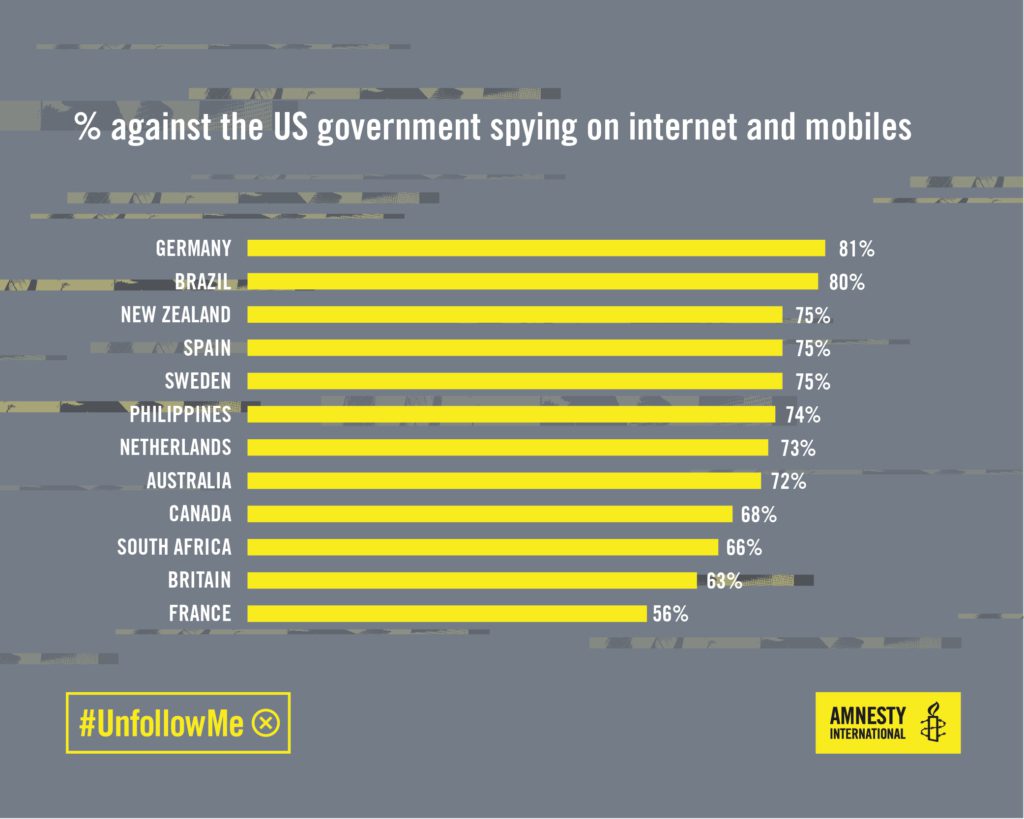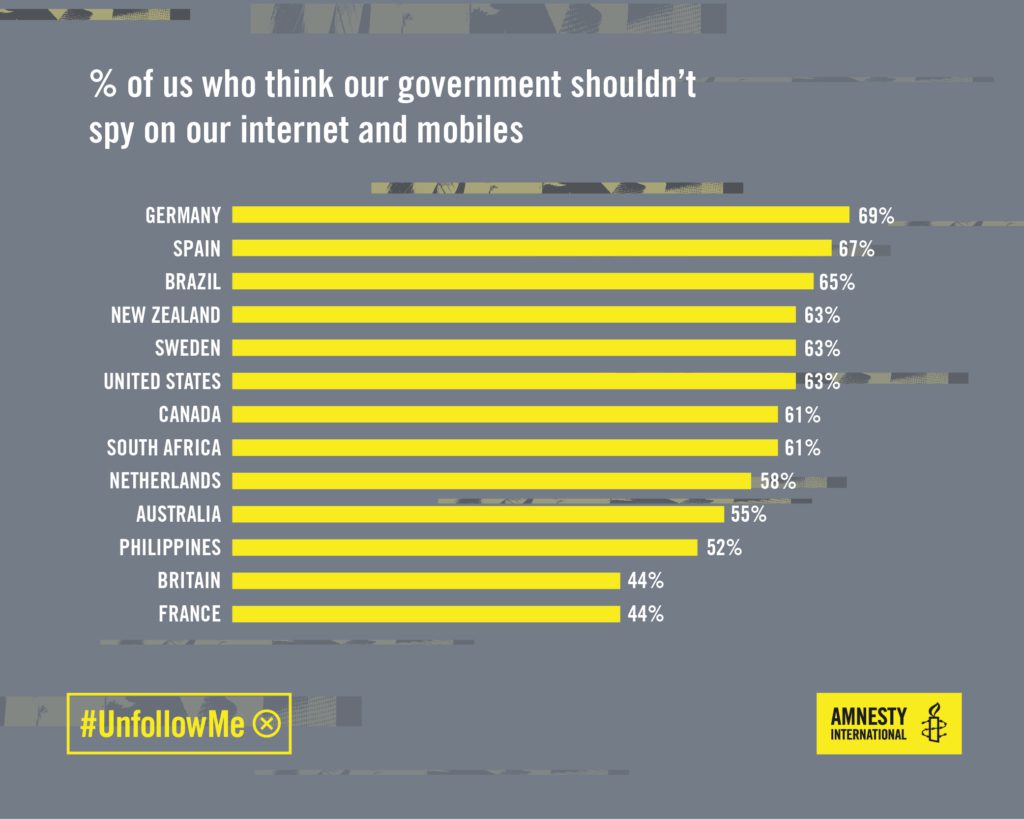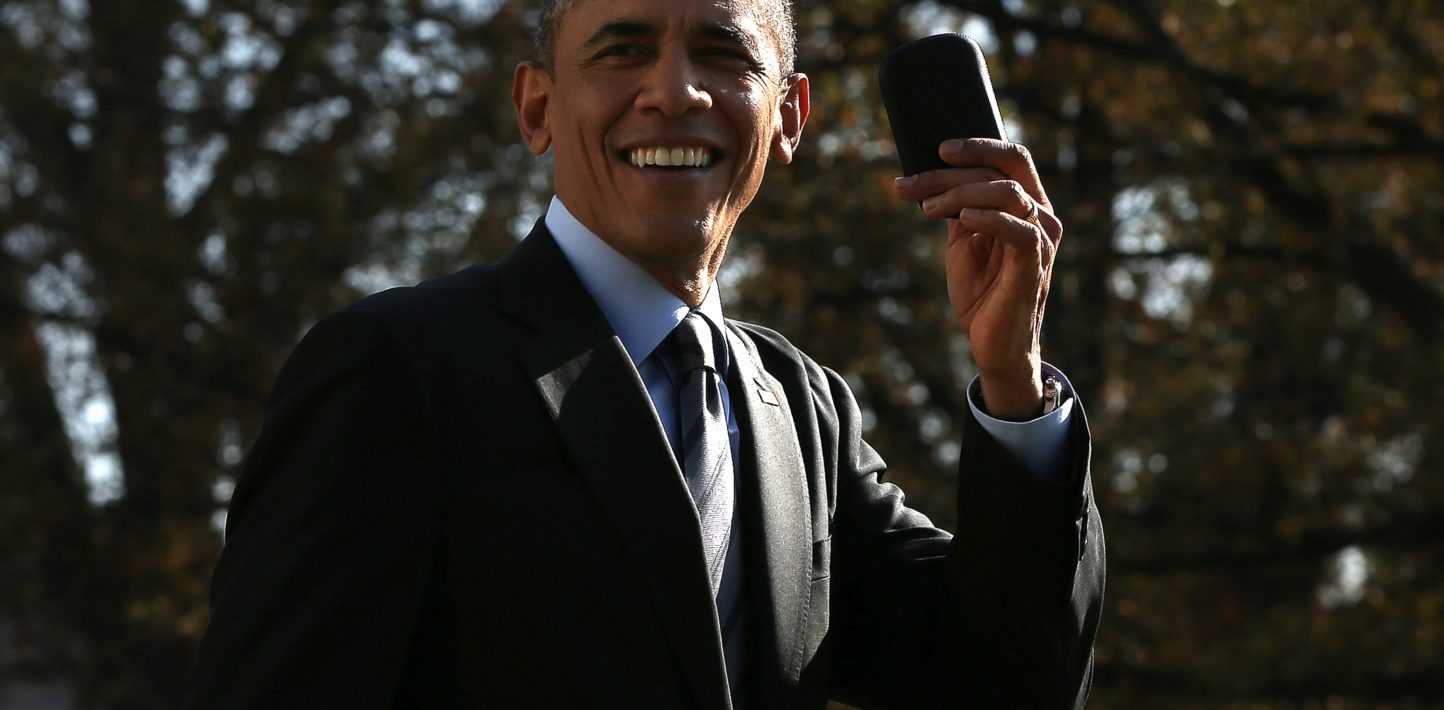Photo: 2014 Getty Images
The United States’ mass surveillance of internet and phone use flies in the face of global public opinion, said Amnesty International as it published a major poll to launch its worldwide #UnfollowMe campaign.
The poll, which questioned 15,000 people from 13 countries across every continent, found that 71% of respondents were strongly opposed to the United States monitoring their internet use. Meanwhile, nearly two thirds said they wanted tech companies – like Google, Microsoft and Yahoo – to secure their communications to prevent government access.
“The United States should see this poll as a warning that surveillance is damaging its credibility. President Obama should heed the voice of people around the world and stop using the internet as a tool for collecting mass data about peoples’ private lives,” said Salil Shetty, Amnesty International’s Secretary General.
The United States should see this poll as a warning that surveillance is damaging its credibility. President Obama should heed the voice of people around the world and stop using the internet as a tool for collecting mass data about peoples’ private lives.
Salil Shetty, Amnesty International’s Secretary General
“Today’s technology gives governments unprecedented power to watch what we do on the internet. We need independent scrutiny to watch the watchers so that power is not abused. Yet today there is little or no legislation in any country that really protects our human right to privacy against indiscriminate mass surveillance. Indeed, more countries are actually considering laws granting wider surveillance powers, at the expense of people’s rights.”
In June 2013 whistle-blower Edward Snowden revealed that the US National Security Agency was authorised to monitor phone and internet use in 193 countries around the world. In a snapshot of the agency’s surveillance capabilities, it was revealed that it collected 5 billion records of mobile phone location a day and 42 billion internet records – including email and browsing history – a month.
Opposition to US mass surveillance strongest in Brazil, Germany
Strongest opposition to the US intercepting, storing and analysing internet use came from Brazil (80% against) and Germany (81%).

Following the Snowden revelations, there was widespread public outcry in both countries after it was revealed that even the phone calls of Brazil’s President Dilma Rousseff and German Chancellor Angela Merkel had been monitored by the US.
Even in the country with least opposition, France, the majority of people still opposed US surveillance (56%). The poll was taken after the Charlie Hebdo attack. Key US allies also oppose surveillance
The United States shares the fruits of its mass surveillance programme with Australia, Canada, New Zealand and the United Kingdom under the Five Eyes Alliance. Even in these countries, more than three times as many people oppose US surveillance (70%) as support it (17%).
“The message is clear: even citizens of the United States’ closest allies do not want their internet use recorded by governments. The UK and other Five Eyes countries should be open with their own people about how they are sharing the spoils of surveillance – our personal data,” said Salil Shetty.
Tech companies under pressure to help, not hinder, privacy rights
People also think tech companies – like Google, Microsoft and Yahoo – have a duty to help them secure their personal information from governments (60%) as opposed to those who agree with firms providing authorities access to data (26%).
In 2013, leaked NSA files revealed that tech companies had cooperated with US authorities to facilitate monitoring of people’s use of their applications, like email and social media platforms.
“Tech companies have a choice to make about the future of the internet. Should it be a place for expression, or repression? They can ask their users to leave privacy rights at the door when logging on, or give them control over their personal data,” said Salil Shetty.
Surveillance at home
In all 13 countries covered by the poll, people did not want their own government to intercept, store and analyse their phone and internet use. On average, twice as many were against surveillance by their government (59%) as those who approved (26%).
Most opposed to mass surveillance by their own government are again people in Brazil (65%) and Germany (69%). Spain (67%), where reports that the NSA tapped 60 million Spanish phone calls were met with outrage in 2013, also topped the opposition table (67%).

The majority of US citizens (63%) are against their government’s surveillance scheme compared to only 20% in favour.
“People want to be followed by their friends, not their governments. They do not want to live under constant scrutiny of a ‘big brother’ surveillance system,” said Salil Shetty.
The enemy within?
Attitudes to surveillance are significantly different when it comes to foreigners living in host nations. Across the 13 countries, slightly more people (45% on average) approve of their governments monitoring foreigners’ phone and internet use in their country, compared to 40% against.
France and Britain top the table of countries in favour of monitoring foreigners in their country, with twice as many people approving (54% and 55% respectively) than opposed it (27% and 26%).
Likewise, half of US citizens felt their government should monitor internet and phone use of foreigners within the US, with only 30% opposing it.
“The fact that people are more willing to accept their government following foreigners than themselves may illustrate the climate of fear stirred up to justify surveillance. Governments must tackle xenophobia and admit sacrificing human rights will not bring greater security,” said Salil Shetty.
Amnesty International is already taking legal action against the US and UK governments in a bid to curb indiscriminate mass surveillance. Today it launches its new #UnfollowMe campaign calling on governments to create oversight and transparency around mass surveillance.


